【复习必背】初中英语词汇和短语(重点)
初中英语总复习(全册)知识点归纳
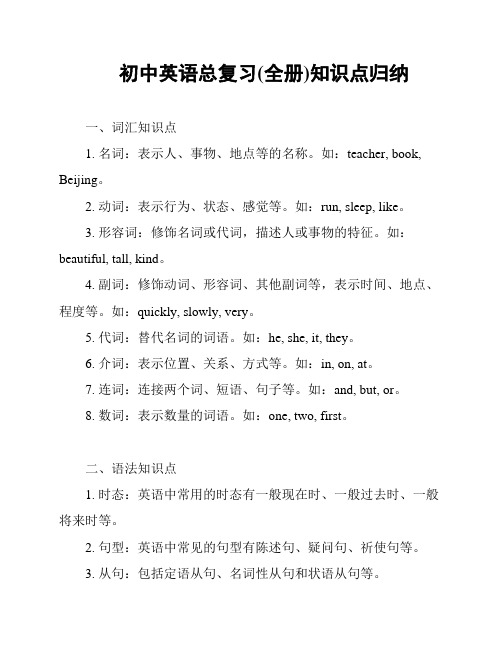
初中英语总复习(全册)知识点归纳一、词汇知识点1. 名词:表示人、事物、地点等的名称。
如:teacher, book, Beijing。
2. 动词:表示行为、状态、感觉等。
如:run, sleep, like。
3. 形容词:修饰名词或代词,描述人或事物的特征。
如:beautiful, tall, kind。
4. 副词:修饰动词、形容词、其他副词等,表示时间、地点、程度等。
如:quickly, slowly, very。
5. 代词:替代名词的词语。
如:he, she, it, they。
6. 介词:表示位置、关系、方式等。
如:in, on, at。
7. 连词:连接两个词、短语、句子等。
如:and, but, or。
8. 数词:表示数量的词语。
如:one, two, first。
二、语法知识点1. 时态:英语中常用的时态有一般现在时、一般过去时、一般将来时等。
2. 句型:英语中常见的句型有陈述句、疑问句、祈使句等。
3. 从句:包括定语从句、名词性从句和状语从句等。
4. 否定形式:在英语中通过在句子中加入否定词来表示否定的意思。
5. 疑问形式:在英语中通过改变句子语序或加入疑问词来构成疑问句。
6. 介词短语:一种由介词和它的宾语构成的结构,用来修饰名词或动词。
三、阅读技巧1. 抓主题:阅读时要注意抓住文章的主题,从中找出关键信息。
2. 理解词义:通过上下文,猜测不认识的单词的意思。
3. 推理推断:通过已知信息进行推理,得出未知信息。
4. 划重点:将文章中所述的重要信息标记出来,有助于记忆和理解。
5. 阅读速度:提高阅读速度的技巧有先读标题、段落开头和结尾。
以上是初中英语总复的知识点归纳,希望对你的复有所帮助!。
初中英语知识点必背总结
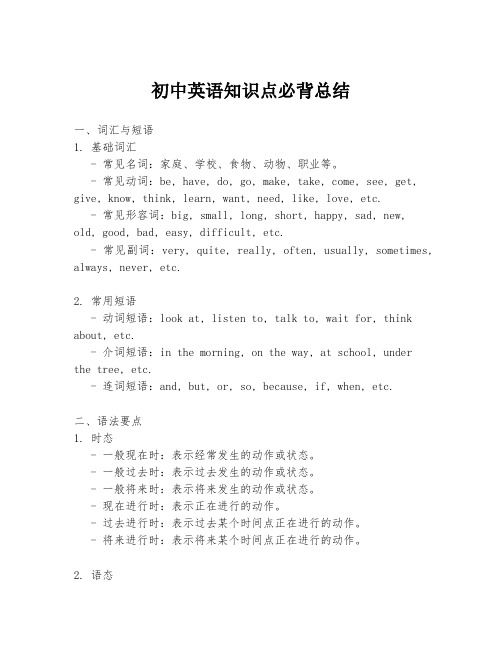
初中英语知识点必背总结一、词汇与短语1. 基础词汇- 常见名词:家庭、学校、食物、动物、职业等。
- 常见动词:be, have, do, go, make, take, come, see, get, give, know, think, learn, want, need, like, love, etc.- 常见形容词:big, small, long, short, happy, sad, new, old, good, bad, easy, difficult, etc.- 常见副词:very, quite, really, often, usually, sometimes, always, never, etc.2. 常用短语- 动词短语:look at, listen to, talk to, wait for, think about, etc.- 介词短语:in the morning, on the way, at school, underthe tree, etc.- 连词短语:and, but, or, so, because, if, when, etc.二、语法要点1. 时态- 一般现在时:表示经常发生的动作或状态。
- 一般过去时:表示过去发生的动作或状态。
- 一般将来时:表示将来发生的动作或状态。
- 现在进行时:表示正在进行的动作。
- 过去进行时:表示过去某个时间点正在进行的动作。
- 将来进行时:表示将来某个时间点正在进行的动作。
2. 语态- 被动语态:be + 过去分词,表示动作的承受者。
3. 非谓语动词- 动名词:表示动作的名词形式,如swimming, reading。
- 分词:现在分词(doing)和过去分词(done)。
- 不定式:to + 动词原形,表示动作的目的或意图。
4. 句型结构- 陈述句:用来陈述事实或观点。
- 疑问句:用来提出问题。
- 否定句:用来表示否定意义。
初中英语重点句型、短语(中考必背!)

[短语、词组归纳]由动词开头构成的短语、词组很多。
复习时应分类处理:一、动词+介词1.look at…看…,look like … 看上去像……,look after …照料… 2.listen to…听……3.welcome to…欢迎到……4.say hello to …向……问好5.speak to…对……说话此类短语相当于及物动词,其后必须带宾语,但宾语无论是名词还是代词,都要放在介词之后。
二、动词+副词“动词+副词”所构成的短语义分为两类:A.动词(vt.)+副词1.put on 穿上 2.take off脱下 3.write down记下此类短语可以带宾语,宾语若是名词,放在副词前后皆可;宾语若是人称代词,只能放在副词的前面。
B.动词(vi)+副词。
1.come on赶快 2.get up起床 3.go home回家4.come in进来 5.sit down坐下 6.stand up起立此类短语属于不及物动词,不可以带宾语。
三、其它类动词词组1.close the door2.1ook the same3.go to work/class4.be ill5.have a look/seat6.have supper7.1ook young 8.go shopping 9.watch TV/games10. play games[介词短语聚焦]“介词+名词/代词”所构成的短语称为介词短语。
现将Unitsl-16常用的介词短语按用法进行归类。
1.in+语言/颜色/衣帽等,表示使用某种语言或穿着……。
2.in + Row/ Team/ Class/ Grade等,表示“在……排/队/班级/年级”等。
3.in the morning/ afternoon/ evening/ 表示“在上午/下午/傍晚”等一段时间。
4.in the desk/ pencil-box/bedroom 等表示“在书桌/铅笔盒/卧室里”。
必考知识点初中英语

必考知识点初中英语初中英语是学生英语学习的关键阶段,涵盖了基础语法、词汇、句型结构、阅读理解和写作等多个方面。
以下是一些必考知识点的总结:1. 基础语法:- 名词:单复数形式,专有名词与普通名词。
- 动词:时态(一般现在时、一般过去时、一般将来时等),语态(主动语态和被动语态),非谓语动词(动名词、不定式、现在分词和过去分词)。
- 形容词和副词:比较级和最高级,形容词的用法。
- 代词:人称代词,物主代词,反身代词,指示代词等。
- 介词:介词的用法和固定搭配。
- 连词:并列连词和从属连词的使用。
- 冠词:不定冠词和定冠词的使用。
2. 词汇:- 常用词汇的记忆和运用。
- 词根、词缀对词汇理解和记忆的帮助。
- 同义词和反义词的辨析。
3. 句型结构:- 简单句、并列句和复合句的构成。
- 直接引语和间接引语的转换。
- 条件句、时间状语从句、地点状语从句等的使用。
4. 阅读理解:- 快速阅读和精读技巧。
- 理解文章主旨大意和细节信息。
- 推断词义和作者意图。
5. 写作:- 记叙文、说明文、议论文的基本结构。
- 写作中如何使用恰当的时态和语态。
- 写作中如何组织段落和使用连接词。
6. 听力:- 听力理解技巧,如预测、关键词捕捉等。
- 对话和短文的理解。
7. 口语:- 日常交际用语的掌握。
- 发音的准确性和流利度。
8. 翻译:- 英译汉和汉译英的基本技巧。
- 直译和意译的区别和应用。
9. 综合运用:- 跨文化交际意识的培养。
- 英语思维的培养和运用。
掌握这些知识点对于提高英语综合运用能力至关重要。
学生应该通过不断的练习和复习来巩固这些知识点,并在实际的语言使用中加以应用。
九年级英语各单元重点单词和短语
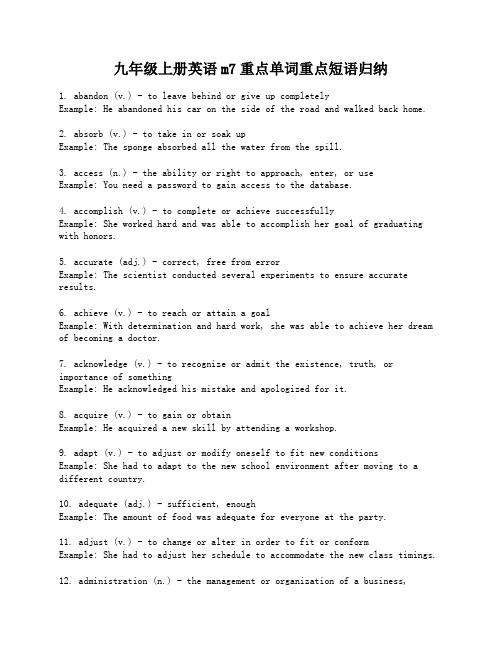
九年级上册英语m7重点单词重点短语归纳1. abandon (v.) - to leave behind or give up completelyExample: He abandoned his car on the side of the road and walked back home.2. absorb (v.) - to take in or soak upExample: The sponge absorbed all the water from the spill.3. access (n.) - the ability or right to approach, enter, or useExample: You need a password to gain access to the database.4. accomplish (v.) - to complete or achieve successfullyExample: She worked hard and was able to accomplish her goal of graduating with honors.5. accurate (adj.) - correct, free from errorExample: The scientist conducted several experiments to ensure accurate results.6. achieve (v.) - to reach or attain a goalExample: With determination and hard work, she was able to achieve her dream of becoming a doctor.7. acknowledge (v.) - to recognize or admit the existence, truth, or importance of somethingExample: He acknowledged his mistake and apologized for it.8. acquire (v.) - to gain or obtainExample: He acquired a new skill by attending a workshop.9. adapt (v.) - to adjust or modify oneself to fit new conditionsExample: She had to adapt to the new school environment after moving to a different country.10. adequate (adj.) - sufficient, enoughExample: The amount of food was adequate for everyone at the party.11. adjust (v.) - to change or alter in order to fit or conformExample: She had to adjust her schedule to accommodate the new class timings.12. administration (n.) - the management or organization of a business,government, or institutionExample: The administration of the school implemented new policies to improve student performance.13. adopt (v.) - to take and raise as one's own childExample: They decided to adopt a baby from another country.14. advantage (n.) - a condition or circumstance that gives one a favorable position over othersExample: His height gave him an advantage in basketball.15. advice (n.) - a suggestion or recommendation about what to doExample: She sought her friend's advice before making a decision.16. affect (v.) - to influence or cause a change in somethingExample: The news of the accident affected her greatly.17. agriculture (n.) - the science, art, or practice of cultivating the soil, producing crops, and raising livestockExample: The country relies heavily on agriculture for its economy.18. aid (n.) - assistance, helpExample: The Red Cross provided aid to the victims of the natural disaster.19. aim (v.) - to direct one's efforts towards achieving a specific goal Example: They aimed to finish the project by the end of the week.20. alert (adj.) - aware, attentive, watchfulExample: The security guard remained alert throughout the night shift.21. alliance (n.) - a union or association formed for mutual benefit, especially between countries or organizationsExample: The two companies formed an alliance to collaborate on a new project.22. alternative (n.) - an option or choice between two or more possibilities Example: If you don't like this restaurant, there are plenty of alternatives nearby.23. ambitious (adj.) - having a strong desire to succeed or achieve something Example: She has always been ambitious and aims for the top positions in her career.24. analyze (v.) - to examine or study carefully in order to understand or explainExample: The scientist analyzed the data collected during the experiment.25. ancestor (n.) - a person from whom one is descended, such as a grandparent or great-grandparentExample: He researched his family tree and traced his ancestors back to Ireland.26. ancient (adj.) - very old, from a long time agoExample: The ruins of the ancient city were discovered during an archaeological dig.27. annoy (v.) - to irritate or bother someoneExample: The constant noise from the construction site annoyed the neighbors.28. annual (adj.) - happening once a yearExample: The school holds an annual sports day for students.29. anticipate (v.) - to expect or look forward to somethingExample: She anticipated a promotion after working hard for several years.30. anxious (adj.) - feeling worried or nervous about something that may happenExample: He was anxious about his upcoming job interview.31. apologize (v.) - to say sorry or express regret for something you have done wrongExample: She apologized for arriving late to the meeting.32. apparent (adj.) - clearly visible or understood; obviousExample: The cause of the fire was not apparent at first, but further investigation revealed it was due to faulty wiring.33. appreciate (v.) - to recognize the value or significance of something; to be grateful forExample: I really appreciate your help with this project.34. approach (v.) - to come near or closer to someone or somethingExample: She approached the teacher after class to ask for clarification.35. appropriate (adj.) - suitable or proper in the circumstancesExample: Wearing casual clothes to a formal event would not be appropriate.36. argue (v.) - to give reasons for or against something; to engage in a verbal disagreementExample: They argued about the best way to solve the problem.37. artificial (adj.) - made or produced by humans rather than occurring naturallyExample: The flowers in her garden were artificial, but they looked real.38. ashamed (adj.) - feeling guilty or embarrassed about something that one has doneExample: He felt ashamed of his mistake and apologized.39. assess (v.) - to evaluate or determine the nature, quality, or importance of somethingExample: The teacher assessed the students' understanding of the lesson through a quiz.40. associate (v.) - to connect or link something with something else in one's mindExample: She always associates the smell of coffee with mornings.41. assume (v.) - to suppose or take for granted without evidenceExample: He assumed she would be at the party, but she had to cancel.42. attach (v.) - to fasten or join one thing to anotherExample: Please attach your resume to the job application.43. attempt (v.) - to try or make an effort to do somethingExample: He attempted to climb the mountain but had to turn back due to bad weather.44. attractive (adj.) - pleasing or appealing to the senses or mindExample: The painting was very attractive and caught the attention of many visitors.45. authority (n.) - the power or right to give orders, make decisions, or enforce obedienceExample: The principal has the authority to make disciplinary decisions.46. avoid (v.) - to keep away from or prevent oneself from doing something Example: She tried to avoid eating junk food to maintain a healthy diet.47. aware (adj.) - having knowledge or consciousness of somethingExample: He was not aware of the new company policy.48. balance (n.) - a state of equilibrium; equal distribution of weight or importanceExample: It is important to maintain a work-life balance.49. ban (v.) - to prohibit or forbid the use, action, or presence of something Example: Smoking is banned in this restaurant.50. bare (adj.) - without any covering or decoration; emptyExample: The room was bare, with no furniture.51. barrier (n.) - a fence or other obstacle that prevents progress or access Example: They removed the barrier and allowed people to enter the park.52. benefit (n.) - an advantage, privilege, or gain that is acquired or derived from somethingExample: Regular exercise has many health benefits.53. blend (v.) - to mix or combine together to form a harmonious whole Example: She blended different spices to create a unique flavor.54. bless (v.) - to consecrate or request divine favor for someone or somethingExample: The priest blessed the couple before their wedding ceremony.55. blame (v.) - to hold responsible or accountable for somethingExample: She blamed her brother for breaking her favorite vase.56. bland (adj.) - lacking strong flavor or character; dullExample: The soup was too bland, so I added more seasoning.57. blend (n.) - a mixture of different elements or substancesExample: The smoothie was a blend of fruit and yogurt.58. bless (v.) - to confer or invoke divine favor upon something or someone Example: He asked God to bless his family.59. boast (v.) - to talk with excessive pride or self-satisfaction about one's own achievementsExample: He boasted about his high test scores.60. bond (n.) - a close connection or relationship between people or things Example: The bond between siblings is often very strong.61. boundary (n.) - a line or area that marks the limits of something Example: The fence marks the boundary between our property and the neighbor's.62. burden (n.) - a load, typically a heavy one, that is difficult to bear Example: The responsibility of taking care of her younger siblings was a burden for her.63. calculate (v.) - to determine or ascertain by mathematical methods; to estimate or predictExample: She calculated the total cost of the project.64. capable (adj.) - having the ability or capacity to do somethingExample: She is capable of handling multiple tasks at once.65. capture (v.) - to take into one's possession or control by force Example: The police were able to capture the criminal.66. care (n.) - the provision of what is necessary for the health, welfare, maintenance, and protection of someone or somethingExample: He took care of his sick mother.67. celebrate (v.) - to honor or acknowledge a significant event or occasion with festivities or rejoicingExample: They celebrated their wedding anniversary with a romantic dinner.68. challenge (n.) - a task or situation that tests someone's abilities or strengthExample: Climbing Mount Everest is a great challenge.69. champion (n.) - a person who has defeated all opponents in a competition or struggled for a causeExample: He became the champion of the tennis tournament.70. chaos (n.) - complete disorder and confusionExample: The classroom was in chaos after the students' food fight.71. characterize (v.) - to describe the distinctive features or qualities of someone or somethingExample: The protagonist in the novel is characterized as brave and intelligent.72. charity (n.) - an organization set up to provide help and raise money for those in needExample: She donated money to a charity that supports education for underprivileged children.73. cheer (v.) - to give a shout of encouragement or applauseExample: The crowd cheered when their team scored a goal.74. cherish (v.) - to hold dear or deeply love something or someone Example: She cherished the necklace her grandmother gave her.75. clarify (v.) - to make clear or understandable by explaining in more detailExample: The teacher clarified the instructions for the assignment.76. classify (v.) - to arrange or organize into categories or groups Example: The books in the library are classified by genre.77. claw (n.) - a sharp, curved nail on the foot of an animalExample: The cat used its claws to climb up the tree.78. client (n.) - a person or organization using the services of a professional or companyExample: She met with her client to discuss their business needs.79. cling (v.) - to hold on tightly to something or someoneExample: The child clung to his mother's hand.80. collapse (v.) - to fall down or give way suddenlyExample: The building collapsed after the earthquake.81. colleague (n.) - a person with whom one works, especially in a profession or businessExample: She had a meeting with her colleagues to discuss the new project.82. collide (v.) - to crash or come into contact with great forceExample: The two cars collided at the intersection.83. colony (n.) - a group of people who settle in a new territory, but remain under the political control of their native landExample: The early English settlers established colonies in America.84. combine (v.) - to join or merge together to form a single entity Example: She combined flour, sugar, and eggs to make a cake.85. comfort (n.) - a state of physical ease and freedom from pain orconstraintExample: The soft bed provided great comfort after a long day.86. communicate (v.) - to share or exchange information, news, or ideas Example: They communicated through email while they were away.87. compare (v.) - to examine the similarities and differences between two or more thingsExample: She compared the prices of different brands before making a purchase.88. compete (v.) - to strive or vie against others in order to achieve a goal or win a prizeExample: Athletes from around the world compete in the Olympics.89. complete (adj.) - having all the necessary or appropriate parts; whole Example: She handed in her complete assignment on time.90. complicated (adj.) - consisting of many interconnecting parts or elements; intricateExample: The instructions for assembling the furniture were very complicated.91. concentrate (v.) - to focus one's attention or mental effort on a particular task or objectExample: She closed the door to concentrate on her studying.92. concern (n.) - a matter of interest or importance to someone; a feeling ofworry or anxietyExample: The safety of the children was their main concern.93. conclude (v.) - to bring to an end; to finishExample: The judge concluded the trial and delivered the verdict.94. confuse (v.) - to mix up or fail to distinguish between two or more things Example: The similar sounding names confused her.95. conquer (v.) - to overcome or subdue something by force, usually in battle Example: The troops conquered the enemy's territory.96. consent (n.) - permission or agreement to do somethingExample: He asked for her consent before using her photograph in his project.。
初中英语必背知识点(专题复习)
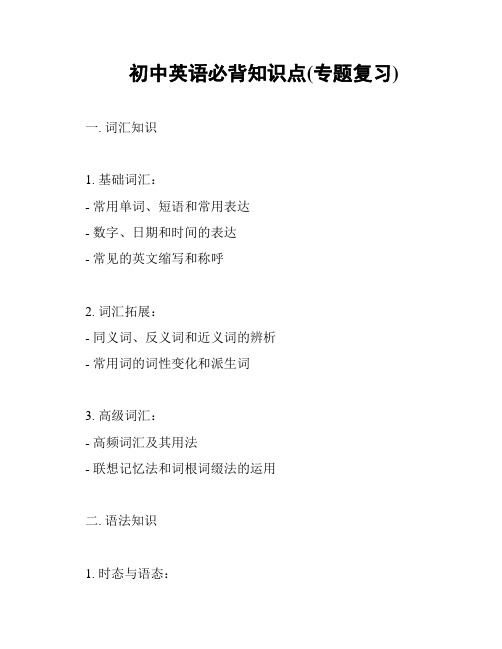
初中英语必背知识点(专题复习)
一. 词汇知识
1. 基础词汇:
- 常用单词、短语和常用表达
- 数字、日期和时间的表达
- 常见的英文缩写和称呼
2. 词汇拓展:
- 同义词、反义词和近义词的辨析
- 常用词的词性变化和派生词
3. 高级词汇:
- 高频词汇及其用法
- 联想记忆法和词根词缀法的运用
二. 语法知识
1. 时态与语态:
- 现在、过去和将来时的用法
- 被动语态的构成和应用
2. 句子结构:
- 主谓一致和主谓宾的搭配
- 并列句、复合句和简单句的转换
3. 修辞手法:
- 比喻、拟人和夸张的运用
- 省略、倒装和强调的使用
三. 阅读理解
1. 阅读技巧:
- 标题、目的和主题的推测
- 推理、推断和判断的训练
2. 阅读策略:
- 首句和细节的关键把握
- 上下文和语境的理解
四. 写作技巧
1. 作文要求:
- 书信、应用文和议论文的写作
- 开头、结尾和段落的构思
2. 写作方法:
- 归纳、列举和论证的技巧
- 表达清晰、连贯和正确的方法
以上是初中英语必背知识点的专题复,通过掌握这些知识,能够更好地应对英语考试,提高自己的语言水平。
(字数:xxx)。
九年级英语必备单词短语
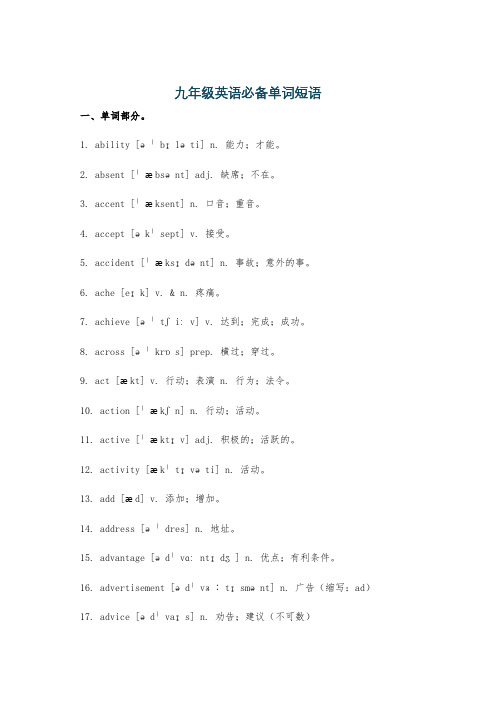
九年级英语必备单词短语一、单词部分。
1. ability [əˈbɪləti] n. 能力;才能。
2. absent [ˈæbsənt] adj. 缺席;不在。
3. accent [ˈæksent] n. 口音;重音。
4. accept [əkˈsept] v. 接受。
5. accident [ˈæksɪdənt] n. 事故;意外的事。
6. ache [eɪk] v. & n. 疼痛。
7. achieve [əˈtʃiːv] v. 达到;完成;成功。
8. across [əˈkrɒs] prep. 横过;穿过。
9. act [ækt] v. 行动;表演 n. 行为;法令。
10. action [ˈækʃn] n. 行动;活动。
11. active [ˈæktɪv] adj. 积极的;活跃的。
12. activity [ækˈtɪvəti] n. 活动。
13. add [æd] v. 添加;增加。
14. address [əˈdres] n. 地址。
15. advantage [ədˈvɑːntɪdʒ] n. 优点;有利条件。
16. advertisement [ədˈvɜːtɪsmənt] n. 广告(缩写:ad)17. advice [ədˈvaɪs] n. 劝告;建议(不可数)18. advise [ədˈvaɪz] v. 劝告;建议。
19. afford [əˈfɔːd] v. 买得起;担负得起。
20. afraid [əˈfreɪd] adj. 害怕的;担心的。
21. Africa [ˈæfrɪkə] n. 非洲。
22. African [ˈæfrɪkən] adj. 非洲的;非洲人的 n. 非洲人。
23. after [ˈɑːftə(r)] prep. & conj. 在……之后;adv. 以后;后来。
八年级英语必背重点单词短语句型全汇总
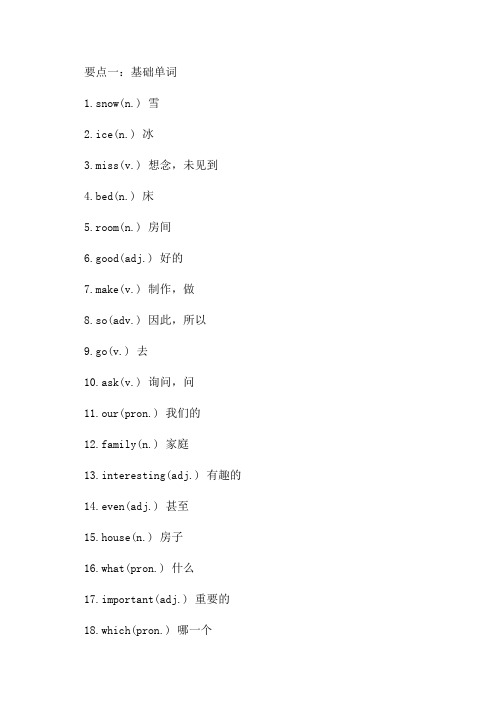
要点一:基础单词1.snow(n.) 雪2.ice(n.) 冰3.miss(v.) 想念,未见到4.bed(n.) 床5.room(n.) 房间6.good(adj.) 好的7.make(v.) 制作,做8.so(adv.) 因此,所以9.go(v.) 去10.ask(v.) 询问,问11.our(pron.) 我们的12.family(n.) 家庭13.interesting(adj.) 有趣的14.even(adj.) 甚至15.house(n.) 房子16.what(pron.) 什么17.important(adj.) 重要的18.which(pron.) 哪一个(n.) 名字20.friend(n.) 朋友要点二:重点短语1.make a snowman 堆雪人2.go skating 去溜冰3.in the snow 在雪中4.say goodbye 告别6.on the ice 在冰上7.play with snow 玩雪8.miss someone 想念人9.go to bed 上床睡觉10.our family 我们的家庭11.have a party 举行聚会12.in our house 在我们的房子里13.a good idea 一个好主意14.an interesting game 一个有趣的游戏15.which room 哪个房间16.a friend's name 一个朋友的名字17.very important 非常重要要点三:重点句型1.Let's make a snowman. 让我们来堆雪人吧。
2.We can go skating. 我们可以去溜冰。
3.The snow is so beautiful. 雪太美了。
4.I will miss you. 我会想念你。
5.Let's go to bed now. 让我们现在上床睡觉吧。
7.We can play with snow. 我们可以玩雪。
